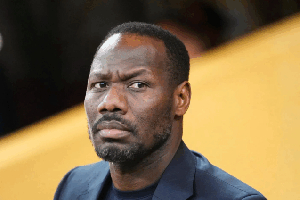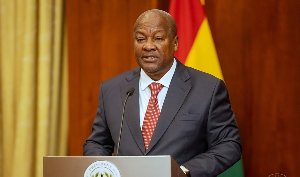General News of Friday, 7 September 2018
Source: thepublisheronline.com
One strong local bank better than 7 weak ones - Akufo-Addo
The President Nana Akufo-Addo has emphatically stated that poorly managed local banks cannot expect government support following the collapse of seven banks.
The President expressed frustration while interacting with the Ghanaian community in Rwanda that after pumping ¢8bn of taxpayer’s money into these banks, its poor liquidity challenges still persisted.
From August 2017 to August 2018, seven banks The Beige Bank, uniBank, UT, Capital, Sovereign, Construction and Royal banks have had their licenses withdrawn.
The Bank of Ghana pumped more than ¢2billion to support uniBank founded by a former governor of the Bank of Ghana, Dr. Kwabena Duffour.
Capital bank also received ¢610m bail-out money from the Bank of Ghana. But of this amount, ¢195m ended up being used to set up the Sovereign Bank. Both banks have now collapsed.
Bankrolled by the government, a new indigenous bank, the Consolidated Bank of Ghana has taken over the assets and liabilities of The Beige Bank, uniBank, Sovereign, Construction and Royal banks.
Before this, GCB took over the assets and liabilities of UT and Capital banks.
Retrenchment figures are expected to hit 2,700 by September 2018 as GCB has laid off up to 1,000 former UT, Capital banks while CBG is expected to sack 1,700.
Government has been criticized in some quarters for failing to support local banks.
Breaking his silence on the bank crisis, the President said local banks play a very important role in the banking sector.
“We cannot have a situation where dominant banks in the country are all foreign banks. It is very dangerous for our future”.
But he would prefer one “much stronger” indigenous bank in addition to GCB than seven “inefficient poorly managed” indigenous ones. He said the CBG will provide the indigenous leadership needed.
“If our own indigenous banks are performing poorly…at the end of the day, if we don’t take care that is what will happen [collapse]”, he said. The President stressed local banks are not above the “rigorous” law of free market economics which rewards efficiency.
“The law of the market will have it that, if you are not performing efficiently you will go under”.
Adongo Disowned
Meanwhile, the Minority Caucus in Parliament says Mr. Isaac Adongo, Member of Parliament for Bolgatanga Central is on his own following his boycott of the ongoing parliamentary probe into the banking sector crisis.
According to Fifi Kwetey, the National Democratic Congress’ (NDC) MP for Ketu South, the Caucus is not in support of Mr. Adongo’s decision.
Mr. Adongo, also a Member of Parliament’s Finance Committee, stormed out of the first hearing on Wednesday describing it as a “rubber stamp process.”
He told the press that the committee had not been furnished with the requisite documents to ensure an effective probe.
The MP suspects there is an attempt at a cover-up following the widespread rot that led to the collapse of seven banks.
But Mr. Kwetey, the Ranking Member on the Finance committee told the media Mr. Adongo’s position “is his individual position. He does not represent the Minority.”
“The views he expressed earlier regarding returning assets to owners of the bank is his individual position as well. He represents none of us on the Finance committee and I can say by extension that he doesn’t represent the Minority as well.”
Meanwhile, the probe will continue today with the expected appearance of the receivers, PWC and KPMG as well as officials of the new Consolidated Bank Ghana.
Adongo’s Contentions
Officials of the Bank of Ghana, including the Governor, Dr. Ernest Addison, appeared before the committee on Wednesday morning.
Mr. Adongo expected that he would have in his possession documents pertaining to the asset quality reviews at uniBank or the terms of reference for the work KPMG did in relation to the bank, among others.
“These are the documents they gave to us; statement of the banking sector, press release by the Bank of Ghana, Governor’s speech. When it comes to KPMG, they only give you conditions and opinions of uniBank.”
The MP insisted that “those documents will give me a clearer understanding of what happened and not what the government tells me. I must read the documents and ask the Governor the appropriate questions.”
The Finance Committee of Parliament is holding the hearings from September 5 to September 7.
Representatives from Consolidated Bank, KPMG, PwC and the Ministry of Finance are expected to appear before the hearing.
But owners and directors of the seven banks that have collapsed, some under controversial circumstances, will not be invited.












